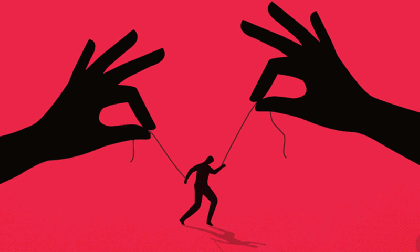Identifying Manipulative Tactics in Relationships
In relationships, manipulative actions can be subtly woven into the dynamic, making them hard to pinpoint. It's vital to recognize these actions to ensure the health of your relationship and your personal welfare. Below are several manipulative behaviors to watch out for, including their identification and ways to confront them.
1. Gaslighting
Gaslighting is a kind of mental manipulation where one person causes their partner to question their own memories, perceptions, or decisions. Common phrases include "You're overreacting," "That didn't happen," or "You're just imagining it." This tactic can significantly damage self-esteem and trust in one’s own judgement.
How to Spot It
If you often doubt your reality or feel confused about previous events in your relationship, this might indicate gaslighting. Other signs include feeling isolated, being consistently lied to, or having your experiences downplayed.
2. Guilt-Tripping
This tactic involves making someone feel guilty to control or sway their behavior. It often shows up in statements like "Look at everything I've done for you," or "You don't seem to care about me."
How to Spot It
If you frequently feel like you're tiptoeing around your partner's feelings, or if you find yourself acting out of guilt instead of genuine desire, it's likely guilt-tripping.
3. Silent Treatment
Using silence as a manipulation tool, the silent treatment involves one partner ignoring or refusing to speak with the other. This method often serves as a form of punishment and can cause emotional stress.
How to Spot It
If your partner consistently avoids conversation, particularly following disagreements, and uses silence as a tactic, it's a clear indicator of this manipulative method.
4. Love Bombing
Characterized by an excessive outpouring of affection and attention, love bombing is used to gain control or influence. It usually includes an overload of communication, gifts, and praises.
How to Spot It
If the intense affection feels excessive or manipulative, or if it is utilized to justify abusive behavior, it could be love bombing. It’s concerning if this affection ceases abruptly or is conditional.
5. Isolation
Manipulators often attempt to isolate their partners from their support network. This can involve criticizing friends and family, dominating time, or even relocating.
How to Spot It
If your social interactions are dwindling or if you're being discouraged from meeting with close ones, it might be an isolation strategy.
6. Financial Control
Financial control is a manipulative tactic where one partner dominates the other's financial affairs. This involves controlling spending habits, restricting access to funds, or unilaterally making financial choices.
How to Spot It
Feeling helpless regarding finances or having to continually explain expenditures may indicate economic manipulation.
7. Coercion with Threats
Using threats and ultimatums as a means of coercion employs fear to compel obedience. This might involve threats of terminating the relationship, self-harm, or other forms of emotional intimidation.
How to Spot It
Persistent efforts to avoid provoking adverse reactions or facing "this or that" choices signify a concerning issue.
8. Excessive Reliance
Excessive reliance occurs when one partner unduly depends on the other for emotional, physical, or financial support, detrimentally impacting the other's autonomy and well-being. This includes demanding involvement in every facet of the other's life, leading to a responsibility for their happiness and welfare.
How to Spot It
Feeling burdened by your partner's relentless demand for attention and support, to the extent that it hinders your personal life and duties, suggests excessive reliance.
9. Blame Shifting
Blame shifting involves one partner habitually attributing their actions or relationship problems to the other. Typical expressions include "You made me do this" or "If only you hadn't/had done this."
How to Spot It
Regularly being held accountable for issues, regardless of circumstances, or feeling liable for your partner's actions and feelings, is a sign of this behavior.
10. Playing the Victim
In this tactic, a partner consistently portrays themselves as the aggrieved party in all situations to garner sympathy and manipulate the other. This diverts attention from their conduct to the partner's alleged faults or lack of support.
How to Spot It
If your partner frequently assumes the victim role during disputes or to deflect from their actions, it indicates manipulative behavior.
11. Sporadic Reinforcement
Sporadic reinforcement uses irregular rewards and penalties to foster uncertainty and dependence. This may manifest as alternating periods of kindness and cruelty, or affection and neglect.
How to Spot It
A relationship marked by inconsistent patterns of positive and negative behavior, leading to continual unease and apprehension, may suggest sporadic reinforcement.
12. Undermining Compliments
Undermining compliments are a deceptive strategy where one partner subtly offers insincere praises or slight insults to diminish the other's self-esteem, fostering emotional reliance and a need for their approval. For instance, a partner may comment, "You're quite clever for someone not fond of reading," or "It's admirable how little concern you show for your appearance."
How to Spot It
This conduct becomes apparent when compliments from your partner consistently make you feel belittled or less self-assured. A continual effort to gain their approval or feel adequate may indicate the presence of undermining compliments.
The Consequences of Deceptive Tactics
These tactics can severely impact the victim's psychological health, including:
Diminished Self-Worth
Persistent criticism and undermining can foster self-doubt and lower self-esteem.
Emotional Distress
The tension and uncertainty brought by such tactics can lead to mental health struggles.
Dependence
Isolation and excessive adoration may cause an unhealthy reliance on the deceiver.
Trust Issues
Experiencing deception can hinder trust in others, affecting future relationships.
Confronting These Tactics
Recognizing manipulation is crucial in addressing it. Here's how to deal with deceptive tactics in a relationship:
Recognize the Problem
Periodically evaluate your emotions and relationship health. If such tactics are evident, understand their effect on you. Denial can obstruct addressing these issues.
Open Communication
If it's safe, express your concerns to your partner. Clarify which behaviors you perceive as manipulative and their impact. Avoid engaging in blame, victimization, or dependency. Preserve your autonomy and viewpoint.
Establish Boundaries
Setting clear boundaries is essential. Inform your partner about your limits.
Seek Support
Consult with friends, family, or a therapist. Support systems provide essential advice and emotional support.
Focus on Self-Care
Prioritize your mental and emotional health. Engage in activities that enhance your self-esteem and autonomy.
Evaluate the Relationship
In some cases, ending the relationship may be the best option, particularly if your partner doesn't recognize or alter their behavior.
Conclusion
Deceptive tactics in a relationship can inflict lasting emotional harm. Recognizing these actions is key to tackling them. Effective communication, boundary setting, and seeking support are important. Always prioritize your well-being and assess the relationship's health. A healthy relationship is founded on mutual respect, trust, and understanding, not deceit and control.



















